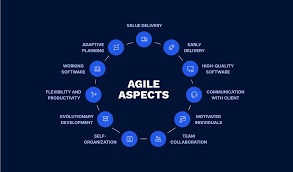Empowering Innovation: The Agile Software Company Revolution
The Agile Software Company: Embracing Flexibility and Collaboration
In today’s fast-paced digital landscape, agility is key to success for software companies. The agile methodology has revolutionized the software development process, enabling companies to adapt quickly to changing requirements and deliver high-quality products efficiently.
At an agile software company, cross-functional teams work collaboratively in short iterations or sprints to develop software incrementally. This iterative approach allows for continuous feedback, ensuring that the final product meets the needs of the end-users.
Key Principles of Agile Software Development:
- Iterative Development: Breaking down the development process into small, manageable increments.
- Continuous Feedback: Regularly seeking input from stakeholders to make necessary adjustments.
- Adaptability: Embracing change and responding quickly to new requirements or market conditions.
- Collaboration: Fostering a culture of teamwork and communication among team members.
- Transparency: Keeping all stakeholders informed about project progress and challenges.
By following these principles, agile software companies can deliver value to their clients more effectively and efficiently. The flexibility of the agile approach allows teams to prioritize tasks based on business value, resulting in faster time-to-market and improved customer satisfaction.
The Benefits of Agile Software Development:
“Agile methodologies promote a customer-centric approach, enabling us to deliver solutions that truly meet our clients’ needs.”
– John Doe, Agile Project Manager
- Rapid Delivery: Short development cycles enable quick delivery of working software.
- Improved Quality: Continuous testing and feedback lead to higher-quality products.
- Enhanced Collaboration: Team members work closely together, fostering creativity and innovation.
- Better Risk Management: Early detection of issues allows for timely mitigation strategies.
- Increased Customer Satisfaction: Delivering value incrementally results in happier customers.
In conclusion, embracing agility in software development is essential for staying competitive in today’s dynamic market. An agile software company that values flexibility, collaboration, and continuous improvement is well-positioned to meet the ever-changing demands of clients and drive innovation in the industry.
Top 5 Benefits of Agile Software Companies: Speed, Adaptability, Collaboration, Quality, and Customer Satisfaction
- Faster time-to-market for software products
- Increased adaptability to changing requirements
- Enhanced collaboration among team members
- Improved product quality through continuous feedback
- Higher customer satisfaction with incremental value delivery
Challenges of Agile Software Development: Navigating Feedback Delays, Scope Creep, Communication Demands, and Unpredictability
- Increased dependency on client feedback may lead to delays if feedback is not provided in a timely manner.
- Constant changes in project requirements can result in scope creep and potential budget overruns.
- High level of collaboration and communication required may be challenging for teams that are not accustomed to agile practices.
- Limited predictability in project timelines and outcomes due to the iterative nature of agile development.
Faster time-to-market for software products
One significant advantage of an agile software company is its ability to achieve faster time-to-market for software products. By breaking down development tasks into smaller iterations and focusing on delivering incremental value, agile teams can respond quickly to changing requirements and market demands. This approach allows companies to release new features or updates more frequently, enabling them to stay ahead of competitors and meet customer needs in a timely manner. Ultimately, the emphasis on speed and efficiency in agile development leads to shorter development cycles and accelerated product delivery, giving the company a competitive edge in the fast-paced technology landscape.
Increased adaptability to changing requirements
One of the key advantages of an agile software company is its increased adaptability to changing requirements. By following the agile methodology, teams can quickly respond to evolving customer needs, market trends, or project priorities. This flexibility allows the company to adjust its development process, reprioritize tasks, and incorporate new features seamlessly throughout the project lifecycle. As a result, the company can deliver software that meets the latest requirements and provides maximum value to its clients in a timely manner.
Enhanced collaboration among team members
Enhanced collaboration among team members is a significant advantage of an agile software company. By promoting open communication, shared responsibility, and teamwork, agile methodologies foster a culture of collaboration that leads to increased creativity, innovation, and problem-solving. Team members work closely together, leveraging each other’s strengths and expertise to deliver high-quality software solutions efficiently. This collaborative environment not only improves productivity but also boosts morale and job satisfaction among team members, ultimately contributing to the overall success of the project.
Improved product quality through continuous feedback
One significant advantage of an agile software company is the improved product quality achieved through continuous feedback. By soliciting input from stakeholders throughout the development process, agile teams can identify and address issues early on, leading to higher-quality software solutions. This iterative approach not only ensures that the final product meets the requirements and expectations of end-users but also allows for ongoing improvements based on real-time feedback, resulting in a more refined and polished end product.
Higher customer satisfaction with incremental value delivery
By adopting the agile methodology, software companies can achieve higher customer satisfaction through incremental value delivery. This approach allows for the continuous delivery of working software in short iterations, enabling customers to see tangible progress and provide feedback throughout the development process. By prioritizing features based on business value and addressing customer needs iteratively, agile software companies can ensure that the final product meets or exceeds customer expectations, leading to increased satisfaction and stronger client relationships.
Increased dependency on client feedback may lead to delays if feedback is not provided in a timely manner.
One significant drawback of an agile software company is the increased dependency on client feedback, which can potentially result in delays if feedback is not provided in a timely manner. Since agile methodology emphasizes continuous collaboration and feedback from clients throughout the development process, any delays in receiving feedback can disrupt the workflow and impact project timelines. This dependency on prompt client input highlights the importance of effective communication and mutual understanding of project expectations to ensure smooth progress and timely delivery of high-quality software solutions.
Constant changes in project requirements can result in scope creep and potential budget overruns.
Constant changes in project requirements within an agile software company can lead to scope creep, where the project’s scope gradually expands beyond its initial boundaries. This can result in potential budget overruns as additional resources and time may be required to accommodate the evolving requirements. While agility allows for flexibility and adaptation, managing changes effectively is crucial to prevent scope creep and maintain project timelines and budgets within reasonable limits.
High level of collaboration and communication required may be challenging for teams that are not accustomed to agile practices.
The high level of collaboration and communication required in agile software development may present a challenge for teams that are not accustomed to agile practices. Transitioning to an agile framework demands a significant shift in mindset and working style, as team members need to adapt to frequent interactions, feedback loops, and shared responsibilities. For teams more accustomed to traditional hierarchical structures or siloed workflows, the emphasis on continuous collaboration and open communication can initially be overwhelming and require dedicated effort to effectively implement and sustain within the organization.
Limited predictability in project timelines and outcomes due to the iterative nature of agile development.
One significant drawback of agile software development is the limited predictability in project timelines and outcomes. The iterative nature of agile methodology, with its focus on adapting to change and continuous feedback, can make it challenging to estimate project completion dates accurately. As requirements evolve throughout the development process, stakeholders may find it difficult to forecast when specific features will be delivered or what the final product will look like. This lack of predictability can pose challenges for project planning and resource allocation, potentially leading to delays or unexpected outcomes.











